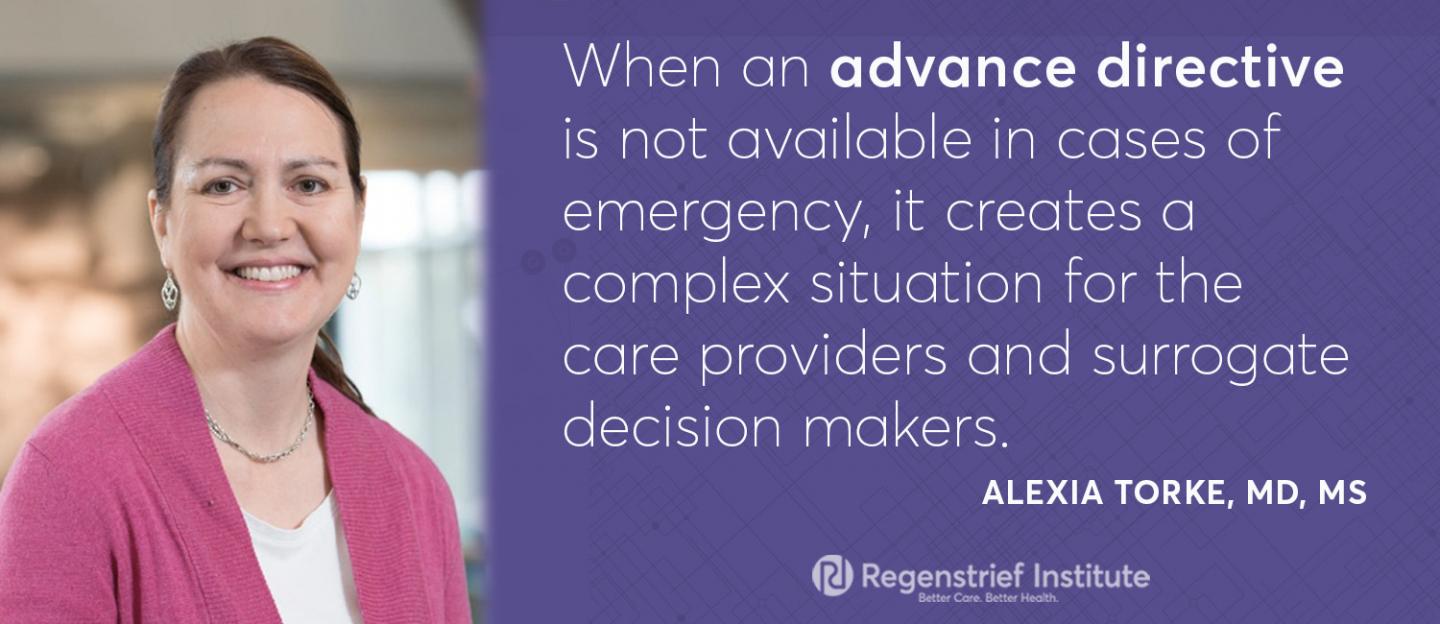Missed opportunity creates complex situation for care providers and loved ones

Credit: Regenstrief Institute
INDIANAPOLIS -The majority of people visiting preoperative testing clinics before an elective surgery do not have an advance directive (AD) in case of surgical complications. This can lead to situations where patients’ families are forced to make tough decisions about their loved one’s care.
A study from researchers at the Regenstrief Institute, Indiana University Health and Indiana University School of Medicine found that only 30% of the patients in the study reported having some form of AD documenting their wishes regarding emergency medical care. However, only 16% had one on file in their electronic medical record (EMR) where a clinician could access it at the time of surgery. When there is no record of care preferences, families must decide what kind of emergency care their loved one receives.
An advance directive is a legal document stating the patient’s wishes for care if he or she is incapacitated. These preferences can include whether or not the person wants to receive CPR or intubation or who is in charge of making care decisions on their behalf. If there is no AD, doctors turn to a priority list of people, reaching out to them, in order of priority, to make the decision.
The lead author of the study, Shilpee Sinha, M.D., is the service line lead for the Adult Academic Health Center for Palliative Care at IU Health in Indianapolis. She sees patients every day who are at an increased risk of surgical complications. “When a crisis does occur,” Dr. Sinha said, “family members tend to project their own emotions into what they think is best for the patient, but their choices may not be what the patient actually wants.”
Dr. Sinha and her colleagues looked at EMRs of 400 patients who underwent preoperative evaluation. They found only 16% of those people had some form of AD on file.
Dr. Sinha performed this research as part of The Advanced Scholars Program for Internists in Research and Education (ASPIRE). ASPIRE is a one-year program through the Division of General Internal Medicine and Geriatrics at IU School of Medicine and the Regenstrief Institute that provides physicians in clinical practice with a chance to hone their skills in research.
“One of my goals for doing this study is to drive clinical change,” said Dr. Sinha. “The discussion of advance care planning is not part of the established routine. I think we’ve achieved buy-in on the idea of having these conversations. Now we need actual logistical application.”
Regenstrief researcher Alexia Torke, M.D., M.S., was Dr. Sinha’s mentor through the ASPIRE program, and senior author of this paper. She has conducted extensive research in surrogate decision making.
“When an AD is not available in cases of emergency, it creates a complex situation for the care providers and surrogate decision makers. Emotions are often high, and family members may have difficulty navigating those emotions to make the best decision for their loved ones,” said Dr. Torke. “Work like Dr. Sinha’s is very important. These findings suggest there is a significant opportunity for improvement in advanced care planning in the clinical setting.”
“Advance Care Planning in A Preoperative Clinic: A Retrospective Chart Review” was published in the Journal of General Internal Medicine. The study was funded through the ASPIRE program. Dr. Torke was supported by a Midcareer Investigator Award in Patient-Oriented Research (K24 AG053794) from the National Institute on Aging.
###
About the Authors
In addition to her role in the ASPIRE program and at IU Health, Dr. Sinha is also an assistant professor of clinical medicine at the Indiana University School of Medicine.
Dr. Torke is an associate director of the Center for Aging Research at Regenstrief Institute, a cooperative effort with the IU School of Medicine. She is also the associate chief for the IU School of Medicine Division of General Internal Medicine and Geriatrics and an associate professor. Dr. Torke is the director of the Evans Center for Spiritual and Religious Values in Healthcare and the fellowship director at the Fairbanks Center for Medical Ethics at IU Health.
Other authors on the paper include Rachel Gruber, M.S., of Regenstrief Institute, ASPIRE and Roudebush VA Medical Center; Ann H. Cottingham, MAR, M.A., of ASPIRE, IU School of Medicine, Roudebush VA Medical Center, and IU Center for Health Services and Outcomes Research; Barb Nation, R.N., CHPN, of IU Health Physicians and IU School of Medicine; Kathleen A. Lane, M.S., and Na Bo, MSPH, both of IU School of Medicine and Roudebush VA Medical Center.
More on the ASPIRE Program
The ASPIRE program was created by Greg Sachs, M.D., a research scientist with Regenstrief Institute and division chief of general internal medicine and geriatrics at IU School of Medicine.
Dr. Sinha and six other clinicians joined the first ASPIRE cohort in 2017. Dr. Sinha saw it as a chance to get “unburied” from everyday duties that had begun to feel mundane. “It allows you to do something meaningful through an academic endeavor that brings the joy back to your profession,” she said.
“Advance Care Planning in A Preoperative Clinic: A Retrospective Chart Review” is the first paper to be published from that group. In her paper, Dr. Sinha gave special acknowledgement to Dr. Sachs, the program creator, and Richard M. Frankel, Ph.D. for their mentorship through the program.
ASPIRE will begin enrolling its third cohort in 2020.
Media Contact
Cindy Fox Aisen
[email protected]
Related Journal Article
http://dx.




